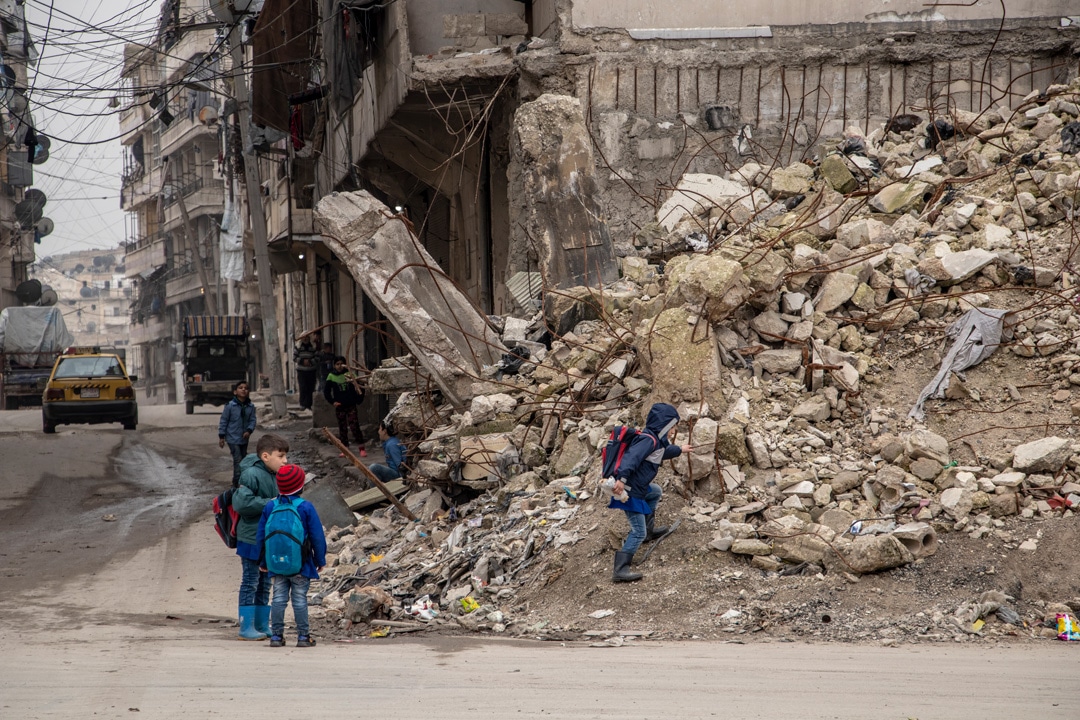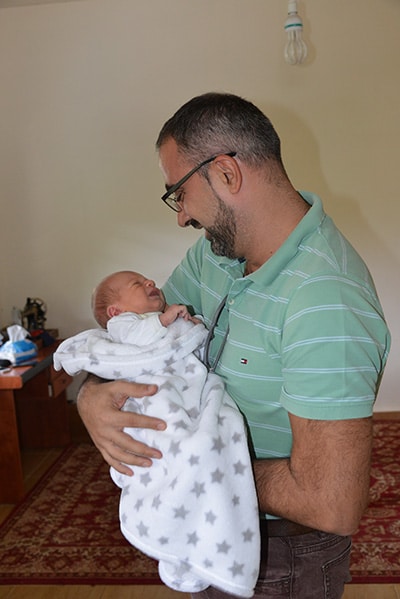
10 years from the beginning of the war in Syria and 15 years of humanitarian projects: an interview with Tommaso Saltini
The 15th of March is the anniversary of the beginning of the war in Syria. Pro Terra Sancta is present in this country, currently in political, economic and sanitary crisis, since 2006 with development and educational projects plus humanitarian support. We interviewed one of the very few to travel in Syria after the conflict arose, our General Director Tommaso Saltini and he gave us a testimony of these dramatic years.

Why is the pro Terra Sancta Association active in Syria, being it so distant from Jerusalem and Palestine in our collective minds?
Syria is one of the countries we are operating in because it belongs to the Holy Land. Currently the Holy Land is divided in different countries and different governments but, for many centuries, it was just one land called Levant or Orient. Romans’ Syria was far more vast than the current one and it included Palestine. In Syria, south of Lebanon, Jesus visited and preached in all the villages of Galilea, as the Gospel says. Saint Paul also traveled in Syria where, in Antiochus, the first Christian community was funded.
When and in what occasion Pro Terra Sancta stared its activities in Syria?
Our Association supports the presence of Franciscan friars, local Christian communities and the ecumenical Church. Franciscans landed in Syria in the 17th-19th Century in the North, the very portion of the country that suffered for the control of Jihad. We started our operation in 2006 thanks to ft Pizzaballa, at the time the Holy Land Custodian and our pro tempore President. It was him asking me first to pay a visit to the Christian communities and friars in Syria in order to testify their presence and collect their needs. Starting from Latakia, I’ve veisited the villages in the North, currently under the control either of the Jihad or Turkey. It was clear that they were in need of educational and social programs paying attention to kids, women and disabled people in particular, some of the categories of beneficiaries we traditionally take care of. My trip also included the villages of Kanye and Yacoubieh and then I landed in Aleppo where the presence of the Custody and of friars is strong. From here I took the train, something now impossible to do, to Damascus. The beginning of our commitment to Syria was due to ft Michele Piccirillo, a Franciscan archaeologist belonging to the Studium biblicum. With Carla Benelli, precious collaborator of Pro Terra Sancta, he started to teach local teenagers and young people also coming from Lebanon and Jourdan how to restore mosaics. That’s why in 2009 we applied to the Ministry of Foreign Affairs and International Cooperation a project concerning the restoration of a mosaic floor in Hama’s byzantine church with the collaboration of the Syrian Antiquity Department. The project was finally approved in 2011 but we never saw it starting as the War began the same year.
How did you react to the arising of the conflict? What did it change?
The beginning of the war surprised me. I always perceived Syria to be a very nice country, well developed -no public debt, stable economy- a western county with a strong oriental characterization. Now, thinking about it, I have to recognize the population was caged: the regime of the Hassad family was getting looser but, nonetheless, it was still a regime. Ft Pizzaballa was absolutely not surprised as he knew that trust was broken and many wounds were not healed. A real reconciliation never took place nor the theme of forgiveness was brought up and, as a Christian myself, I believe that forgiveness is the only solution to traumas and solving conflicts. We immediately started to raise awareness about the harsh situation and the necessity to act. We positioned ourselves as a channel to bring economic help in Syria as, from the very beginning of the war, it was impossible to reach the country with human help and primary goods. With the funds risen we opened emergency centers in the city of Aleppo, Damascus, Latakia and Knaye and from here we stared to systematically provide people with care boxes.
Despite the political turbulences and the conflict, we continued to travel and operate in the country in a very difficult context. We can tell that, from the very beginning, it was not a war only between Syrians. Here opposite politic factions, Sunni and Shiites are fighting and here the interests of external international political forces are converging. For centuries the Levant was a battle field because it also is a channel for the passage of goods. As Association, Syria challenged us with humanitarian emergencies. Our ONG was founded to defend the cultural heritage of Holy Land, to promote economic development and give social-educational support. We were born to operate under the sign of Christian Charity and what we try to do, both during emergencies and completing our projects, is to give our help. This help, for how gives or receive it, is an occasion to create bounds.
Our Association fosters bonds between religious Heads, different religions, local communities and the world. The few locals that helped us during the war had the chance to meet people very far from their reality: Muslims, poor families and friars. All of this would not be possible if the War did not rise because the communities were living in peace but not dialoguing. One memory from my first journey in Syria after the beginning of the war in 2016, is me asking ft Ibrahim to organize a meeting with young people from his church. It was a lovely meeting, the first time I’ve realized how the Christian communities of the Orient feel very close to us. We, on the other side, identify them as Arabs because of the language, we think they are Muslims following Islam and we don’t feel them as close as they do with us. Supporting those communities means to support a common ideal, recognize and love Christ. It means to support one common population, the Christian one and it also means to be in peace with other religions loving the other, the poor and doing good deeds.
What Pro Terra Sancta’s projects are currently active in Syria? What are the projects for the future?
The emergency centers are still active and we want to close them as soon as the conflict is over. It’s incredible to think that it has already been 10 years from the beginning of the war and there is still no peace. Not only there are no internal agreements but there are not even pacts with other Countries: Italy itself is still in war with Syria. We, as most of the western countries, reconfirmed the sanctions to Syria and this lead the population to starvation and desperation. Everything basilar is missing: there is no water, no food, no medicines and no electricity. But we are not giving up and with the help of our friends we are trying to overcome the emergency by launching socially responsible entrepreneurial projects and giving away micro grants to finance or reactivate local commercial activities. We succeed in helping many families this way, particularly in Aleppo.
We would like to also launch innovative entrepreneurial projects in the agro-business, as the friars own some land that could be used for this purpose, and –this is still a newborn idea- in the wellness sector based on the Syrian traditional medicine and cosmetic practices. The first mean of substance for these projects will be donations but what we strive for are convertible grants, a way to give back the received sum in financing the educational programs of the Association if the entrepreneurial activity will be successful. The other main area where we are investing is education. With the collaboration of the Franciscan friars we are thinking of reopening the schools that were confiscated by Hassan Sr. and that, apparently, will soon be given back.
Lastly, based on what we have already done, we want to open other cultural centers. We ransomed a propriety in Damascus and we are now restoring it in order to showcase books, have concerts, project films, give high-quality professional formation and promote culture and beauty as a way to make young people coming from different religions bond with each other. With the support of our President and current Holy Land Custodian ft. Francesco Patton, we try to maximize the valorization of relationships with the Universities of Syria and Lebanon: it is in the universities you will find skilled human resources able to think about real solutions for the people in need. We facilitate links between local and European Universities; we foster bonds between people and ideas. The Levant, the now wounded Syria, was always a bridge between West and East and, as Pro Terra Sancta, we would be honored to help this land get back its pivotal role as a place of engagement and connection.